Maggie Valentine, Ph.D., teaches history and theory of architecture, urban planning, and interior design at USTA. She received her Ph.D. in Architecture and Urban Planning from UCLA. She has also co-authored several master plans for communities in South Texas.
Author Archive
Notes from Underground
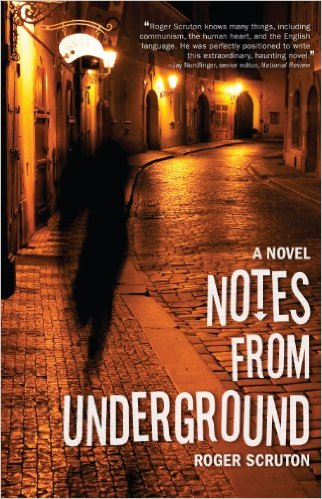
Set in the twilight years of the Czechoslovak communist regime, this novel describes a doomed love affair between two young people trapped by the system. Roger Scruton evokes a world in which every word and gesture bears a double meaning, as people seek to find truth amid the lies and love in the midst of betrayal. Underground Notes tells the story of Jan Reichl, condemned to a menial life by his father’s alleged crime, and of Betka, the girl who offers him education, opportunity, and love, but who mysteriously refuses to commit herself.
Through his encounter with the underground culture and the underground church, Jan comes to understand that truth will always elude those who pursue it, and will come only when they least expect it, often, as in this case, with devastating results. As the story moves to its tragic conclusion the communist system enters its death throes. Jan enjoys freedom at last, only to understand that he has lost the love that would have made freedom meaningful.
Roger Scruton gives an unforgettable portrait of Prague and its underground life, as it was during the 1980s, and before the communist collapse. And he provides a unique insight into the fears and hopes of young people, at a time when it was often a crime to be young.
About: Roger Scruton
Hardcover: $24.95 (ISBN: 9780825307287)
Paperback: $14.94 (ISBN: 9780825307850)
E-book: $14.95 (ISBN: 9780825306617)
Political Fiction
Pages: 216 (hardcover, e-book); 244 (paperback)
Order Here:
Banned Books Week
Tuesday, September 24th, 2013This week is Banned Books Week, so I am going to write about my (terribly important) opinions about a couple of banned and challenged books of this year. Let me start off by saying that many of the books that are banned in schools and libraries tend to veer towards the ridiculous side of the spectrum, e.g. the Captain Underpants series (REALLY?!). While it may not be the most thought-provoking children’s book of its time, this series has a wide audience and is not meant to be an educational, informational book. Unless you need an education on boogers and wedgies. Then they’ve got your whole curriculum covered. Banning and challenging other, more intellectual and educational books, in my opinion, can be limiting to the education of the students in school. An excellent example of a great book that was largely challenged this year is Persepolis: The Story of a Childhood by Marjane Satrapi.

This autobiographical account of Satrapi’s personal struggles during the Islamic Revolution in Iran in 1979 was written as a graphic novel, taking a more lighthearted approach to a lot of serious and troubling subjects. Satrapi writes as a young version of herself, living in Iran, watching the changes around her in Iran’s culture and government, and also noticing changes within herself as a young woman. As a graphic novel, the book is able to give visuals to readers and create a more complete picture of what was going on in Satrapi’s life and in Iran. The fact that this autobiography is written as a graphic novel also makes the difficult subject matter more accessible to a younger audience, and makes the book a perfect addition to a middle school or high school’s library. While some of the content of the book might go over the heads of some younger readers (the political discussions, Satrapi’s satire and sarcasm, etc.), there are a lot of things covered in the book that I was surprised I didn’t already know about, and I read it as a college freshman.
As I was researching why this book was challenged and on the Banned Books list of 2013, I learned that community leaders and school officials in Chicago attempted to pull this book off of the shelves earlier this year, but there was a major uprising from the students and parents to keep the book as part of the school system’s curriculum. In the novel, Satrapi writes about her struggles with the oppressive government of Iran during her childhood and young adult life, and particularly focuses on her lack of freedom of speech, which was stifling for her as an adolescent who was trying to find her voice amidst the revolution. The students in Chicago used Satrapi’s message to fuel their fight against the censorship that their school was enforcing. From that situation alone, the ideals and importance of Satrapi’s story are clearly evident. Her words created the motivation for these students and parents to question their authority figures, to have their voices heard, and to uphold the principles of the freedom of speech. This story from Chicago showcases what Banned Books Week is all about for me, really.
Read more about other banned and challenged books here: http://www.ila.org/BannedBooks/BBW_2012-2013_Shortlist.pdf
-There’s Always Money in the Beaunana Stand
Free to a good home: book, gently used
Monday, September 23rd, 2013In my quest to read the poor abandoned books on my shelf I was bound to pick up a dud at some point, and I did. I then continued to read it for about five days or so before finally abandoning it. When passersby asked me how the book was going (family members, coworkers, confused strangers), I responded with my complaints about the book thus far. Most accepted my frustrations. One finally asked, “So why are you putting up with it?” It’s a good question. If I hated it so much, why didn’t I just stop reading it? The answer is that I felt, in some ways, that I owed something to the author. As if abandoning the book a quarter of the way through would insult the author (who happens to be deceased), or insult the book itself. So that got me thinking- are there rules about when you can abandon a book? What is the threshold one must pass before deeming a book unworthy? Does it depend on the book, on the general esteem of the author, or something else?
This brings me to this article by goodreads.com:
According to goodreads, most readers will finish the book regardless of their frustrations. It surprised me to find that so many people will finish a book despite disliking it, but I suppose there could be contributing factors- bragging rights for something like Ulysses, staying current in pop culture for something like Twilight. Coming in second is ditching the book after 50-100 pages. This is the method I seem to hold with most often, as I think I finished around 60 pages or so. It’s enough time to allow the book to pick up the pace if it has been slow thus far, and enough time to establish whether or not I think it will be worth my while in the near future.
But am I being unfair to the book, or to the author? I think this article makes my case for me. Says the author, “Stop reading a book if [you] don’t enjoy it…I’ve put down several books over the last few weeks–and it is such a relief. More time for reading good books! Less time reading books out of a sense of obligation.” Personally, I agree. I read books while traveling, more often than not- on the train, on a break at work, while walking down the street. I don’t want to be unhappy and frustrated while doing those things. I’d rather read a book that makes me happy…like the 30 pound Game of Thrones book in my bag which I tote around everywhere.
-A Little Beau Told Me
“Canned food is a perversion.”
Thursday, September 12th, 2013Early this year, I finally finished reading Anna Karenina and was feeling very gloomy. I also found myself much more aware and alert when I was at train stations. I read the book at the perfect time, since the dreary, dismal outlook of the book matched the ugly February weather. I don’t want to give anything away to anyone that hasn’t conquered Karenina yet, but it’s not a feel-good story. I needed to bring my spirits up after traveling through the dark, ominous, Russian countryside for over a month. For many years, my mom told me that I should read A Confederacy of Dunces by John Kennedy Toole. I had never heard of the book before and was still severely engrossed in my depressing, Russian classics. I was planning on re-reading Crime and Punishment after finishing Anna Karenina. But my mom, in her Hail Mary attempt to get me to finally read her recommendation and bring me out of my depressing Russian phase, bought the book for me and sent it to my Kindle. So I read it.
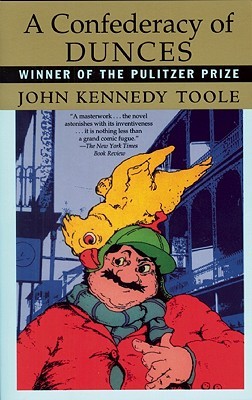
I went into the book with no expectations. I asked my mom what the book was about, and she said that she couldn’t really explain it. She told me it was funny and that I would enjoy it. I was skeptical. I was still in school studying depressing literature and was not really exposing myself to comedic books. My book-radar was shut off from that genre, thinking it was low-brow or somehow inferior to what I was reading for class. But, what was I going to do? It was already on the home page of my Kindle, taunting me. I started reading the book cautiously but openly. And I finished it in about three days. It’s not that it was a short book or an easy read. I just couldn’t put it down.
What caught my comedic interest was the absurdity of the story. The title of this blog post, for example, is a quote from the novel. The protagonist/antagonist/focal point of the novel is named Ignatius Riley, an overweight, thirty-year-old man who lives with his mother in New Orleans. Sounds like a real catch, right? Ignatius has a warped sense of reality, and eventually spreads his warped reality to anyone that encounters him. My mom was right: this book is really hard to explain, but it does involve pirates, pornography, burlesque dancers and their birds, hats with flaps, and medieval philosophy. What more does a book really need?
Digression: While I was refreshing my memory about the book for this blog post, I stumbled upon “The Confederacy of Dunces Curse.” A curse?! I needed to know more. I found out that the author of the book, John Kennedy Toole, had committed suicide at the age of thirty-one. After the book was published, it was shopped around to film makers and studios to make into a movie…and here’s where it gets creepy. John Belushi was first chosen to portray Ignatius, but Belushi’s premature death halted production of this adaptation. The next in line to play Ignatius was John Candy, who also died at a young age and delayed the film even further. Next up was Chris Farley. Are you noticing a pattern?! How weird!
There are still rumors around Hollywood that there will be a movie made of this book, and some names that have been mentioned are Will Ferrell, Jack Black and Zach Galifianakis. For their sakes, I hope this movie is never made. Even though it would be so great. (If you want to read more about the catastrophes and deaths surrounding the production of this movie, check out this link: http://splitsider.com/2013/03/8-actors-who-came-close-to-starring-in-a-confederacy-of-dunces/)
-There’s Always Money in the Beaunana Stand
Lolita? More like LOL-ita!
Thursday, September 5th, 2013Hey reader. I’m Veronica, or There’s Always Money in the Beaunana Stand, one of the new interns at Beaufort, and I’m an Arrested Development addict. AD’s irreverent, awkward, and oftentimes completely insensitive and inappropriate humor is something that I find hilarious, both on television and in the real-world. Finding this particular nom de plume on the list of possible Beaufort puns in the office made me feel a lot more comfortable after I saw it on my first day. As you might expect from my pen-name and confessed interest in the wide world of comedy, I try to find the humor in life. I’ve been told that I laugh at anything, but that is not the case. I just happen to find normal, everyday things to be funnier than the average person might.
As an avid reader and over-all book enthusiast, I have found a general lack of humor in the books that I read. This could possibly be attributed to the fact that I generally read classics (since they are free on my Kindle: thank goodness for public domain books!). Also, I was a Literature major in college and, unfortunately, not many of my required readings were really all that funny. Unless you think Confessions of an Opium Eater is funny. But I didn’t. Due to the amount of depressing and dreary books I have read over the past four years, I have been trying to broaden my scope of potential books to include some more amusing content. I am still enjoying reading my classics (I am currently reading Fitzgerald’s Tender is the Night), but I am breaking up these intense, serious reads with spurts of comedy. Or, at least, I’m trying to.
This past summer my brother gave me a book by John Hodgman, a correspondent for The Daily Show with Jon Stewart (but better known as the guy that played PC in the old Apple versus PC commercials with Justin Long), for my college graduation.

Hodgman on left.
The book is entitled That is All, which my brother thought would be fitting considering I was ending my college career with no job prospects. Thanks brother. After letting the book sit on my desk all summer, mocking me, I finally decided that I would read it. I figured I needed some joy in my life, since I had just finished reading Lolita. If you have never read Lolita and are thinking about reading it, consider your mental state. If you are having a relatively nice time in your life and want to stay positive and upbeat, steer clear. If you are in a dark, dismal funk and want to travel further into the abyss, Lolita is the book for you.
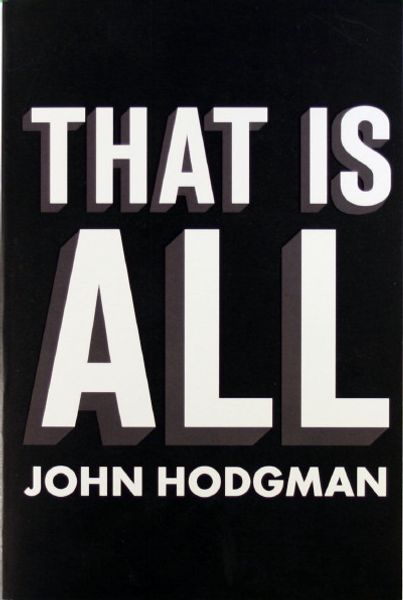
Serious cover page, huh?
But after crawling out of the abyss that I found myself in from Lolita, That is All was the perfect rebound. Hodgman wrote the book in 2012, when the Mayan apocalypse was impending. He wrote the book as a continuation to his first two books (which I have plans to read, if my brother can ever find them in his room). His first two books are titled The Areas of My Expertise and More Information Than You Require. These two books function as fictionalized historical and informational books from the mind of Mr. Hodgman. He fabricates historical events and portrays them as seemingly common-knowledge facts (more specifically common knowledge to those with money and influence, which he finds to be an extremely important gateway to the world). That is All acts as a kind of training manual or preparatory instruction for the impending apocalypse, and hilarity ensues.
I devoured this book. After reading Lolita, this was exactly the kind of book that I was craving. It has sections entitled “How to be a Deranged Millionaire” and “A List of Seven Hundred Ancient and Unspeakable Gods.” I found myself laughing out-loud when reading many sections of this book, which was a new thing for me and got to be a little embarrassing when I read the book at the gym (although not as embarrassing as reading Lolita in the gym). Sometimes, when I read something funny I will giggle quietly or smirk, but this book had me chortling and having to take breaks from reading because I was laughing too hard. After finishing the book, I wanted to read more books that made me feel good, unlike most of the depressing, disheartening books that I normally read. My literary goal at the moment, therefore, is to change up the genre of books I read and steer myself in a more humorous direction. We’ll see how that goes.
-There’s Always Money in the Beaunana Stand
Live From Mongolia
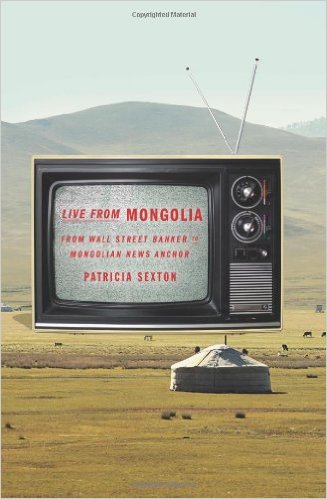
In 2006, author Patricia Sexton set out on a journey most of us have only ever fantasized about. She quit her job to pursue her dream. Thirty years old and a rising star at a Wall Street investment bank, Patricia wanted nothing more than to work as a foreign correspondent. So, that’s just what she did, moving to Mongolia after landing an internship at the country’s national TV station.
Live from Mongolia follows Patricia’s unlikely journey from Wall Street to Ulan Bator. And it doesn’t stop there. Not only does Patricia manage to get promoted to anchor of the Mongolian news, she also begins to meet some very unusual people following very unusual dreams of their own. There’s the Mongolian hip-hop star who worked in London restaurants to make his dream come true, the Italian textile executive who left everything behind to pursue his passion for mozzarella cheese, the German brewmaster plying his trade so lovingly that there were always tears in his eyes. And many more.
Live from Mongolia is the story of this ongoing journey – from a corporate career to a dream job, one that even Patricia hadn’t imagined she would land.
About: Patricia Sexton
Hardcover: $24.95 (ISBN:9780825306976)
Paperback: $14.95 (ISBN: 9780825307973)
Ebook: $4.99 (ISBN: 9780825306570)
Memoir/Inspirational
Pages: 300 (hardcover, e-book); 246 (paperback)
Order Here:
A Few Podcasts
Tuesday, August 20th, 2013For the last two weeks I have been traveling forty five minutes in the morning and forty five minutes in the evening, participating in a ritual that modern humans refer to as a “commute.” I stand or sit in the 1, 2, 3, 4, 5 or Q trains, and I try not to touch the people near me, although sometimes this cannot be avoided. This morning I touched a rabbi’s hand, for example. I try to focus on my shoes and discretely look out the windows to see whether I am close to my stop (I have not yet attuned my circadian rhythms to the subway system) and inevitably make eye contact with someone across from me. I look back at my shoes.
Such is the true life cliché that I live, a Californian transplant in New York City, used to my hermetically sealed box with wheels that modern humans refer to as a “car” but thrust into the sardine box/melting pot/other anthropological-food metaphor that is the MTA. It is both nerve-wracking and utterly boring, and so I have had to develop a few habits to keep my mind occupied in a productive way. Of course by habits I mean “podcasts,” and by develop I mean “find.” So, without further ado, here are some of the (writing-relevant) programs I have been listening to:
1. The New Yorker Fiction Podcast
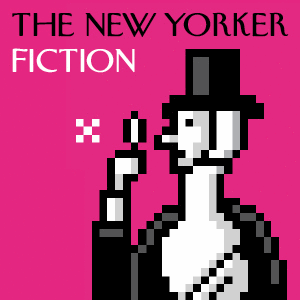
Are you a fan of Italo Calvino, Colum Mcann, John Cheever, Donald Antrim, Donald Barthelme, Denis Johnson, George Saunders, or any other authors published in the New Yorker? Do you appreciate an ethos of studious consideration of and respect for literature? Did you enjoy having stories read to you in soft tones as a child? Welcome to the New Yorker Fiction Podcast, brought to you by Deborah Treisman, the magazine’s very own fiction editor.
In this podcast, Treisman welcomes a New Yorker author, has them read their favorite story published in the magazine, and concludes by discussing with them the story they have read. The podcast is like a double feature in this way: not only do you hear the work of great literary geniuses that the magazine helped establish, you also learn the names and writer-ly habits of the next generation of literary geniuses fostered in its offices. Check in on the first of every month for a new update.
2. The New Yorker Political Scene
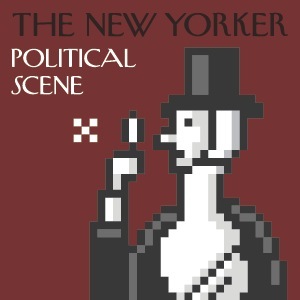
Dorothy Wickenden, who I recently heard lecture at Columbia, hosts this weekly podcast, in which she discusses new political events with New Yorker writers. Wickenden is the Executive Editor at the magazine; shrewd and gracious, she has a great radio presence. She also has the uncanny ability to speak in fully-formed paragraphs and speaks with an awesome but unplaceable accent. I highly recommend any of the podcasts that feature George Packer, famous for his books Assassin’s Gate and The Unwinding (and his general pessimism about America’s future). Check in on Wednesdays or Thursdays for new updates.
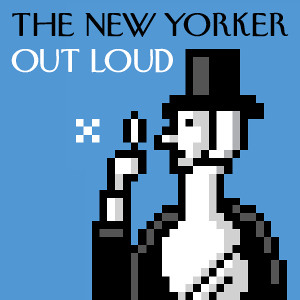
The New Yorker Out Loud has two hosts. The first is Colin Fox, who is an editor of the website and introduces the podcast. The second host, Sasha Weiss, who is the literary editor of the magazine, usually interviews one New Yorker writer about their piece that came out that week. It’s great and highly variable. My favorites are the ones with Emily Nussbaum, the magazine’s TV critic, a former PhD candidate and writer for Lingua Franca. Check in on Mondays for new updates.
4. Longform

Longform.org is a website that aggregates long-form journalism from both the past and the present. You can find both the famous “Frank Sinatra Has a Cold” and the newest profile in GQ, so long as it isn’t behind a pay wall. They are also lucky to have their offices right across the hall from the Atavist, a similar upstart founded by Evan Ratliff, Jefferson Rabb, and Nicholas Thompson that created a platform for multimedia storytelling.
I haven’t quite figured out whether these two companies distinguish between themselves (since Evan Ratliff often serves as a host and has been interviewed on the podcast and in his interview referred to “the office” as if it was the Atavist office), nor can I figure out who the host is. Regardless, they have managed to interview really awesome talents like Jay Caspian Kang, Molly Young, and Emily Nussbaum. Writers interviewing writers about writing is the premise; the shows last for 45 minutes to an hour; check in Wednesdays for new content.
All of these podcasts are free and available on iTunes. So go subscribe! Expand your mind amidst the metal squeals and casual intimacy of Gotham’s subway.
Happy listening,
BEAUseph Conrad
A Little Beau Told Me
Monday, August 12th, 2013Hi there! I’m Sarah, the new publicity intern. Henceforth I’ll go by A Little Beau Told Me, so chosen because of my family’s tendency to use nicknames based on birds.
Lately I’ve had a tendency to collect books faster than I can read them. I just can’t help picking up a book if, say, I peruse a used bookstore or if a friend is passing off a few unwanted titles. I give them a home on my increasingly overfilled bookshelf and it is there that they go to die under a layer of dust. But yes, I needed to buy that copy of Great Expectations because I was an English major and I should read that, shouldn’t I? And I just have to pick up this copy of Midnight in the Garden of Good and Evil from my friend who doesn’t even remember buying it because I liked that movie three years ago, didn’t I?
You really don’t want to know how many copies of Jane Eyre I’ve collected. There was a book I read, or possibly a movie I watched, where the protagonist once owned a book that had an inscription from her father. She proceeds to lose it, so she develops a habit of picking up copies of the book at used bookstores in an attempt to find the missing copy. Every time I mention this someone tells me what movie it’s from and every time I forget, but I still feel the need to own 5 copies of Jane Eyre. My favorite is a 100 year old copy that I picked up for £3 while studying abroad, but I digress.
These books deserve to be read, and I resolve to read them all! I must give Les Miserables another chance, I must try the silly novels I keep telling myself will be great for beach reading, and I must stop buying books that I know I won’t read. Or at least, I should try. At some point. Maybe after I’m done reading Game of Thrones.
I’ll get back to you on that.








